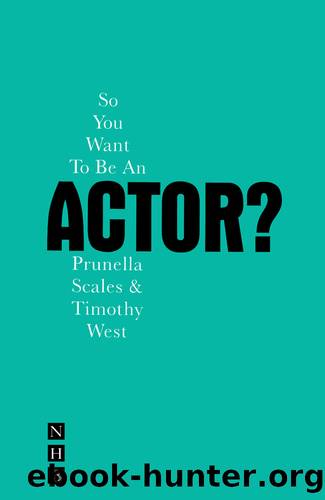So You Want to Be an Actor? by Timothy West

Author:Timothy West
Language: eng
Format: epub
Publisher: Nick Hern Books
DIRECTORS
Directors come from all quarters: there are writers who want to interpret their own work, academics who want to lift the play from page to stage, there are actors-turned-directors, teachers-turned-directors, training-school graduates, and, of course, natural directors.
In the course of their professional lives, actors may come in contact with several hundred different directors, few of whom, however, will have seen any of their own fellows at work. So they tend to do things in their chosen way, whilst the actor gets used to adapting to the different methods of one director after another.
I worked once with an American director who, although he was very brilliant and ultimately achieved an excellent production, used a vocabulary in rehearsal that struck some of us as pretentious, baffling and impractical. Such instructions as âYou two should have a focus on that lineâ, we would learn to translate as meaning that we might at that point exchange a glance. âWe need to create a physical re-orientation,â he would decide, which provoked a terse response, âYou mean you want me to move?â We erected reactionary barriers because as actors we are wary of any sort of directorial approach that seems to threaten our fragile security. Improvisation, role-swapping and games of various kinds all have occasional use in rehearsal, but an intelligent director will be reluctant to introduce such devices until he or she has earned the full confidence of the cast.
Equally of course, itâs up to the actors to be generous and not to withhold that confidence. Directors can be just as thin-skinned as actors, we can all benefit by learning new methods, and the essential thing is to feel that everybody is working towards the same end. The directorâs task is to recognise and to synthesise the various qualities and energies offered by each member of the cast, and to do so in a spirit of harmony. People sometimes ask, âWhat happens if you find youâre in serious disagreement with a director?â In my experience, itâs hardly ever happened. The autocratic days of Erich von Stroheim and Basil Dean are long gone, but you may occasionally come across someone who believes that their own directorial imprint on the play is far more important than the play itself. If you know youâre going to be fundamentally in opposition to a directorâs attitude even before you start, then you shouldnât do the play. Otherwise, try hard to make things work for you the directorâs way before confessing that youâre defeated.
I need to be looked after in rehearsal; encouraged, challenged, pushed; and essentially to be made to feel that I can play the part. I donât care how rigorous or unconventional the method of rehearsal; as long as I remain convinced of the directorâs belief in me, Iâm happy.
Download
This site does not store any files on its server. We only index and link to content provided by other sites. Please contact the content providers to delete copyright contents if any and email us, we'll remove relevant links or contents immediately.
| Ancient & Classical | Anthologies |
| British & Irish | Children's |
| Comedy | LGBT |
| Medieval | Regional & Cultural |
| Religious & Liturgical | Shakespeare |
| Tragedy | United States |
| Women Authors |
Cecilia; Or, Memoirs of an Heiress — Volume 2 by Fanny Burney(31939)
Cecilia; Or, Memoirs of an Heiress — Volume 3 by Fanny Burney(31928)
Dialogue by Robert McKee(4385)
The 101 Dalmatians by Dodie Smith(3505)
Bound by Hatred (The Singham Bloodlines Book 2) by MV Kasi(3074)
The Art of Dramatic Writing: Its Basis in the Creative Interpretation of Human Motives by Egri Lajos(3058)
Harry Potter and the Cursed Child - Parts One and Two by John Tiffany(3027)
The Beautiful Boys: A High School NA Reverse Harem Paranormal Bully Romance (Shadowlight Academy Book 1) by Gow Kailin(2855)
Angels in America by Tony Kushner(2648)
Carrie's War by Nina Bawden(2465)
A Clockwork Orange by Anthony Burgess(2458)
Unlaced by Jaci Burton & Jasmine Haynes & Joey W. Hill & Denise Rossetti(2360)
The Femme Playlist & I Cannot Lie to the Stars That Made Me by Catherine Hernandez(2280)
Open Book by Jessica Simpson(2259)
Drama by John Lithgow(2230)
Outside Woman (BWWM Amish Romance) by Stacy-Deanne(2105)
Terrorist Cop by Mordecai Dzikansky & ROBERT SLATER(2071)
Yerma by Federico García Lorca(2062)
Leo's Desire by Sundari Venkatraman(1929)
